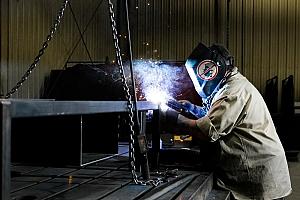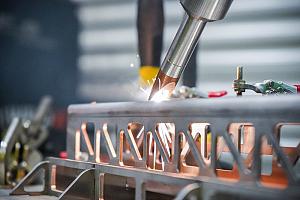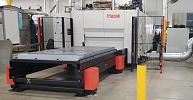Editor-in-Chief
- FMA
- The Fabricator
- FABTECH
- Canadian Metalworking
Categories
- Additive Manufacturing
- Aluminum Welding
- Arc Welding
- Assembly and Joining
- Automation and Robotics
- Bending and Forming
- Consumables
- Cutting and Weld Prep
- Electric Vehicles
- En Español
- Finishing
- Hydroforming
- Laser Cutting
- Laser Welding
- Machining
- Manufacturing Software
- Materials Handling
- Metals/Materials
- Oxyfuel Cutting
- Plasma Cutting
- Power Tools
- Punching and Other Holemaking
- Roll Forming
- Safety
- Sawing
- Shearing
- Shop Management
- Testing and Measuring
- Tube and Pipe Fabrication
- Tube and Pipe Production
- Waterjet Cutting
Industry Directory
Webcasts
Podcasts
FAB 40
Advertise
Subscribe
Account Login
Search
Building a fab business
- By Dan Davis
- July 24, 2015
Last week we got a direct message through one of our social media channels from someone wrapping up his studies to obtain a welding certificate from a California community college before moving on for more education at a four-year school. “Any information on starting and maintaining a successful business would be greatly appreciated,” he wrote.
Luckily, metal fabricating is an industry where the path to becoming your own boss is wide open. If you have the fabricating talent, a commitment to quality, and a personality that meshes well with customers, you have what it takes to make it on your own.
The best way to start down that path is to start fabricating. The question is whether to work for someone else first or to strike out on your own immediately. The latter provides the most security and, honestly, the best chance to be exposed to all aspects of the shop floor and the rest of the business. More modern shops have cross-training programs so that shop floor personnel can do more than burn an arc all day or load sheet metal into a machine tool. If the fab shop is in growth mode, shop floor employees might even have the chance to tackle front-office jobs, such as estimating or sales.
If individuals have a strong entrepreneurial streak, they might consider buying a welding power source, throwing it in the back of a full-sized truck, and hitting the road.
With the proper experiences and possibly even potential customer contacts, budding entrepreneurs can think about establishing a brick-and-mortar location. Of course, plenty of shops start in a garage, but some municipalities, particularly those close to urban areas, may not appreciate businesses being run out of residential neighborhoods. Wherever the location, a fabricator needs room for working, material storage, and equipment, and the proper power setup. At this stage of a business, a shop needs to refine its quoting activities to ensure that it’s making money on jobs, and try out different marketing approaches, such as Internet-based efforts or old-fashioned networking through local groups, such as a town’s chamber of commerce.
If a shop starts to expand, it’s doing something right. Maintaining the culture that spawned the success while hiring new employees, who have their own opinions and work experiences, is a challenge. If employees remain engaged and committed to serving the customer, success can be sustained. At this point an owner or manager of arguably has to spend a majority of his or her time focused on employee training and team communication.
As a metal fabricating shop grows, the business side grows in complexity. It helps to have a veteran of the industry available to answer questions. The FABRICATOR columnist Gerald Davis had a great series about operating a shop called “Wise Words from the Mountaintop." Dick Kallage, another columnist for The FABRICATOR, covers operational tips in his Improvement Insights column. Their observations are based on years of experience in the fabricating industry, and their combined insight can provide valuable information for the young business owner hungry for wisdom.
I’m not sure this information can make a huge difference for the person who posed the question about starting a fabricating business, but hopefully it can help. Having been the proprietor of several failed lemonade stands over the course of a brief entrepreneurial phase in my life, I can’t promise this advice will be a future predictor of economic success.
subscribe now

The Fabricator is North America's leading magazine for the metal forming and fabricating industry. The magazine delivers the news, technical articles, and case histories that enable fabricators to do their jobs more efficiently. The Fabricator has served the industry since 1970.
start your free subscriptionAbout the Author

Dan Davis
2135 Point Blvd.
Elgin, IL 60123
815-227-8281
Dan Davis is editor-in-chief of The Fabricator, the industry's most widely circulated metal fabricating magazine, and its sister publications, The Tube & Pipe Journal and The Welder. He has been with the publications since April 2002.
- Stay connected from anywhere

Easily access valuable industry resources now with full access to the digital edition of The Fabricator.

Easily access valuable industry resources now with full access to the digital edition of The Welder.

Easily access valuable industry resources now with full access to the digital edition of The Tube and Pipe Journal.
- Podcasting
- Podcast:
- The Fabricator Podcast
- Published:
- 04/30/2024
- Running Time:
- 53:00
Seth Feldman of Iowa-based Wertzbaugher Services joins The Fabricator Podcast to offer his take as a Gen Zer...
- Industry Events
Pipe and Tube Conference
- May 21 - 22, 2024
- Omaha, NE
World-Class Roll Forming Workshop
- June 5 - 6, 2024
- Louisville, KY
Advanced Laser Application Workshop
- June 25 - 27, 2024
- Novi, MI
Precision Press Brake Certificate Course
- July 31 - August 1, 2024
- Elgin,































